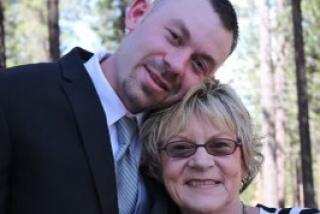Nina Pham, Dallas nurse who survived Ebola, sues hospital
Nurse Nina Pham — once the upbeat face of the Dallas hospital that confronted the country’s first Ebola case — sued the hospital’s parent company Monday, alleging that it had failed to protect her before and after she was diagnosed with the deadly disease last fall.
The lawsuit accuses Texas Health Resources of committing, among other things, gross negligence, fraud and invasion of privacy. Pham’s initial training to treat an Ebola patient consisted of reading information a supervisor obtained through a Google search, the lawsuit says, and Pham initially wore protective gear that left her neck and hair exposed.
“Nina became the face of America’s fight against this fatal and feared pathogen,” the lawsuit says. “What no one knew or understood was that she was also a symbol of corporate neglect — a casualty of a hospital system’s failure to prepare for a known and impending medical crisis.”
Pham, 26, contracted the disease at Texas Health Presbyterian Hospital while treating the country’s first diagnosed Ebola patient, Thomas Eric Duncan. Duncan, 42, fell ill during a visit from his native Liberia in September and died Oct. 8, two days before Pham tested positive.
Pham said in a statement that she had hoped the hospital’s parent company would be “more open and honest about everything that happened at the hospital, and the things they didn’t do that led to me getting infected with Ebola. But that didn’t happen, and I felt I was left with no choice but to turn to the courts for help.”
She added: “I’m facing a number of issues with regard to my health and my career, and the lawsuit provides a way to address them. But more importantly, it will help uncover the truth of what happened, and educate all healthcare providers and administrators about ways to be better prepared for the next public health emergency.”
Pham had initially praised the hospital, releasing a statement in October that said she felt “blessed to be cared for by the best team of doctors and nurses in the world.”
Before she was transferred later that month to a National Institutes of Health hospital near Washington, D.C., nurses and other hospital staff lined up outside Texas Health Presbyterian to see her off. A video released by the Dallas facility showed Pham in her hospital room, telling staff, “I love you guys.”
That was all a show, according to her Dallas attorney Charla Aldous. Although Pham was grateful to the medical team she worked with in the intensive care unit, the hospital put Pham at risk and, once she was infected, used her as “a PR pawn,” Aldous said.
Wendell Watson, a spokesman for Texas Health Resources, declined to address specific allegations.
“Nina Pham served very bravely during a most difficult time as we all struggled to deal with the first case of Ebola to arrive in a U.S. hospital’s emergency room,” Watson said in response to the lawsuit.
“Texas Health Resources has a strong culture of caring and compassion, and we view all our employees as part of our family. That’s why we have continued to support Nina both during and after her illness, and it’s why she is still a member of our team. As distressing as the lawsuit is to us, we remain optimistic that we can resolve this matter with Nina,” he said.
When Pham was called upon to treat Duncan for a possible Ebola infection on Sept. 29, she and other nurses were not provided training or a change of clothes, and were forced to wear contaminated scrubs home, according to the lawsuit. The nurses later switched to protective suits with respirators and reinforced gloves.
“These were the caregivers who were trying to figure this out on the fly,” Aldous said, adding that Pham’s infection “shouldn’t have happened.”
“Healthcare workers in Liberia had better equipment to care for themselves than Nina Pham did the day she started caring for Eric Duncan,” the lawyer said.
After Duncan died, officials from the hospital’s parent company and the Centers for Disease Control and Prevention told Pham that she was at “no risk” of infection and could see family and friends — which she did, placing them at risk, the lawsuit says.
After Pham was admitted and diagnosed with Ebola, the hospital released information saying that her condition was good even though she had asked that information not be released and medical records showed her condition was actually life-threatening, according to the lawsuit.
After Pham became infected, a second nurse who had treated Duncan, Amber Vinson, was also diagnosed with Ebola.
Vinson, 30, also recovered and is in contact with Pham, Aldous said. Vinson has retained a Dallas attorney who did not return calls Monday about whether she plans to sue the hospital.
Duncan’s parents and four children announced in November that they had settled all legal claims against the hospital for an unspecified amount, and the hospital released a statement saying the matter had been “amicably resolved.”
Pham still lives in the Dallas area with her Cavalier King Charles spaniel, Bentley, who became a cause celebre during the Ebola outbreak when he was quarantined and then reunited with his owner after she was discharged from the hospital.
Pham is single and would like to have a family, but she worries about the toll from Ebola and the experimental treatment she received, including new drugs and a blood transfusion from an Ebola survivor. In recent weeks, her hair started falling out, and she called Vinson for advice, Aldous said.
Pham also still suffers body aches, nightmares and stigma, her attorney said.
Pham’s lawsuit demands unspecified damages for physical pain and mental anguish, medical expenses and loss of future earnings. She remains on the hospital’s payroll, her attorney said, but has stopped working and is trying to figure out how she can return to nursing given the trauma and stigma of having survived Ebola.
“She’s the ‘Ebola nurse,’” Aldous said. “Some people even now are apprehensive about touching Nina, being around her, because so little is known about this deadly virus.”
molly.hennessy-fiske@latimes.com
Twitter: @mollyhf
More to Read
Start your day right
Sign up for Essential California for news, features and recommendations from the L.A. Times and beyond in your inbox six days a week.
You may occasionally receive promotional content from the Los Angeles Times.






